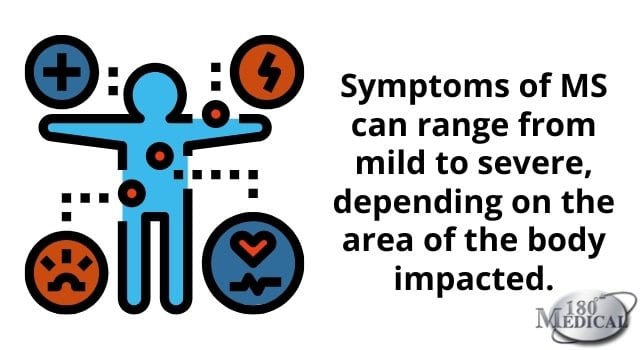
Multiple sclerosis (MS) is an often disabling disease that impacts the central nervous system. It causes the immune system to begin attacking the body’s nerves. Here are the top five things you should know about multiple sclerosis.
Five Things You Should Know About Multiple Sclerosis
So who is affected by this disease? And what causes MS? Let’s go over these questions and more below.
1. No two individuals with MS will have the same symptoms.
Multiple sclerosis (MS) is estimated to affect more than 2.3 million people worldwide. Its symptoms have a wide range of impacts, which can range from mild to severe. Doctors sometimes say that no two individuals with multiple sclerosis will present the exact same symptoms.

The symptoms of MS and what part of the body is impacted depends on each individual. For instance, the level of inflammation in the body may affect how mild or severe the symptom is. Also, the area affected may relate directly to where the nerves are being attacked in the body.
The most common MS symptoms include:
- Fatigue
- Muscle spasms
- Numbness
- Tingling
- Neurogenic bladder (resulting in urinary retention or urinary incontinence)
- Brain fog
- Mobility issues
2. Multiple sclerosis may impact bladder function.
One of the top five things you should know about multiple sclerosis is that it can also potentially impact the bladder. In fact, it’s one of the most common symptoms of MS. According to the National MS Society, bladder dysfunction occurs in at least 80% of people with MS.
Just like any other part of the body, the bladder is controlled by nerves. If nerves leading to the bladder become damaged or inflamed due to multiple sclerosis flare-ups, this can lead to neurogenic bladder.

This may mean the person may experience symptoms of urine leakage due to a more overactive bladder or urinary bladder retention due to an underactive bladder.
Luckily, you have options. Your doctor may prescribe the use of intermittent catheters to help drain the bladder and help reduce your urinary symptoms.
If you need to begin using urinary catheters, contact the catheter experts at 180 Medical.
3. A cure or cause of MS has not been found yet.
Researchers have not pinpointed an exact cause of multiple sclerosis just yet. It’s unclear if this is a genetic disorder, but it does appear that some people are more likely to be diagnosed with MS.
For example, women are almost three times as likely to have MS.
Smoking tobacco may also potentially worsen MS symptoms, although it’s not known if it’s related to a cause of the onset of this disease.
4. MS can be challenging to diagnose at first.
Because multiple sclerosis has symptoms that look like a lot of other conditions at times, it can be difficult for doctors to pinpoint the cause initially.
If you’re seeking a diagnosis and you’re fairly confident you could have MS, don’t give up on finding an answer to what’s going on in your body. It can take time to diagnose MS due to the myriad of symptoms that present.
Also, MS can go into remission or relapse, which means symptoms may go away for weeks, months, or even years at a time. This may also make it difficult to diagnose, especially early on.
Luckily, there are specific tests that can help your doctor or other healthcare specialist determine what’s going on, such as blood tests, MRIs, neurological exams, etc. Talk to your doctor about your health concerns.
5. A diagnosis of MS doesn’t have to mean life is over.
MS is life-changing, certainly. However, it’s not considered a fatal disease. In fact, not only do individuals with MS have a normal life expectancy (except in very rare situations), but they also can often enjoy a full life.
Many people focus on creating and maintaining a healthy lifestyle after their diagnosis. Some prefer to take in more vegetables at every meal, while others may eliminate potentially inflammation-causing foods from their diets. Plus, many people with MS regularly exercise and use other stress management techniques like meditation as part of their overall wellness program.

As technology advances and more research is done, there are more medications and treatment options that can help manage your symptoms for a better quality of life.
If you’re dealing with bladder dysfunction, intermittent catheterization may also help free you up to maintain an active, healthy lifestyle. You can even travel! Check out these helpful travel tips for keeping your catheter supplies discreet from real catheter users.
About 180 Medical
180 Medical provides disposable urinary catheters and other related urological supplies to people with multiple sclerosis across the nation. As the leading provider of catheter supplies, we focus on truly helping those who need our services.
Our friendly specialists can walk you through your catheter options based on your insurance coverage and let you try out free samples. You get to choose what works and feels best to you out of one of the widest selections of catheter brands available today.
Plus, we offer ongoing support and tons of helpful resources.
Get started by contacting 180 Medical today.
Disclaimer: Please note that this is not medical advice and should not be used in place of a visit, call, or consultation with a physician or other healthcare provider.
